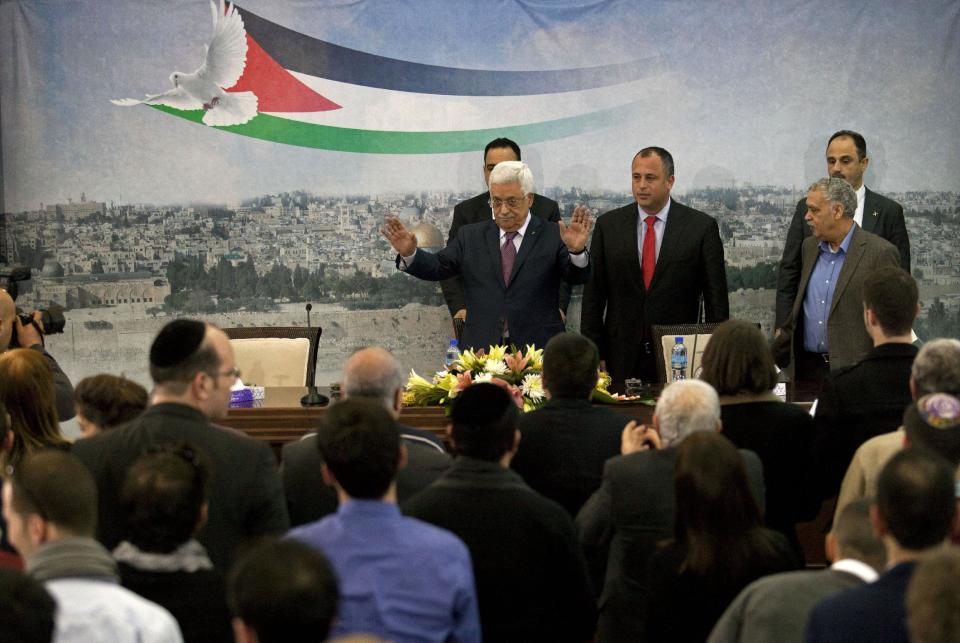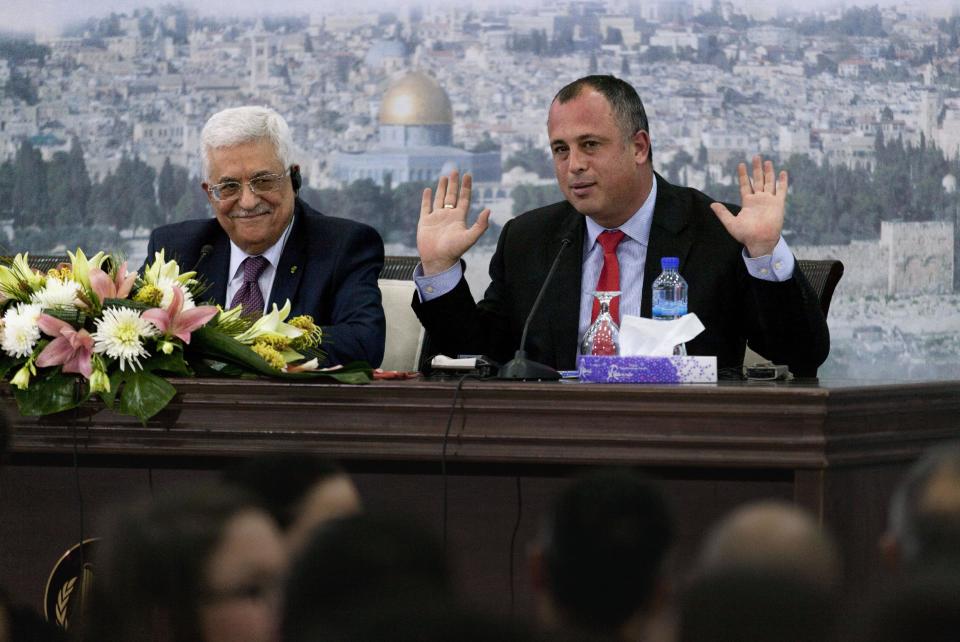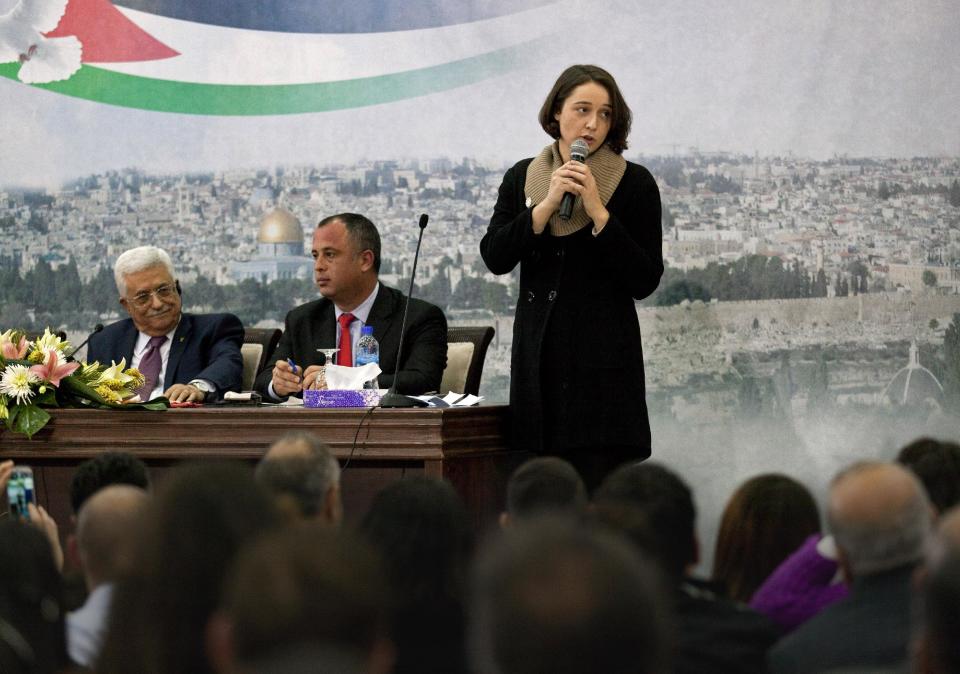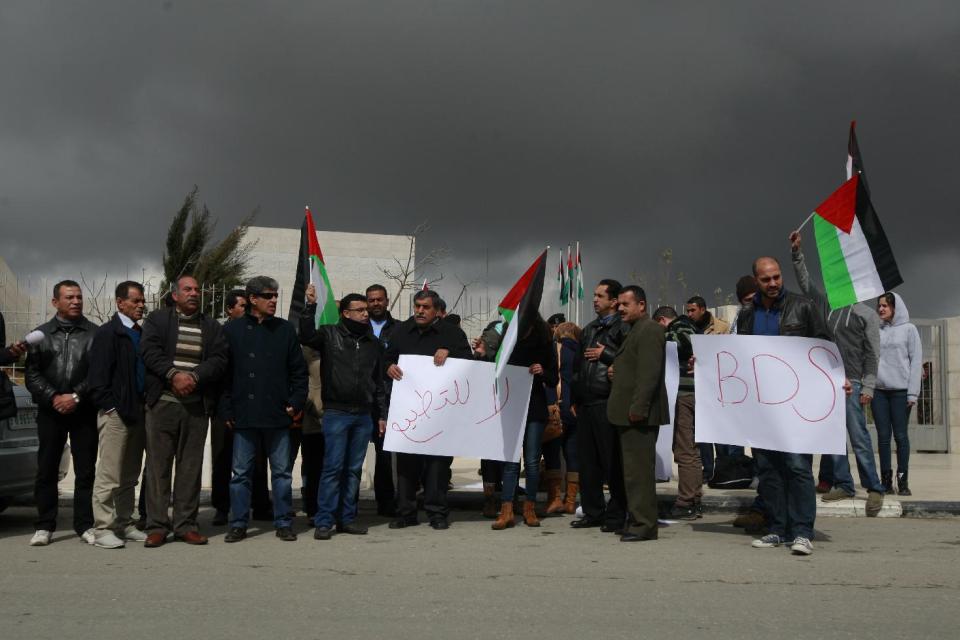Abbas signals flexibility on Palestinian refugees
RAMALLAH, West Bank (AP) — The Palestinian president on Sunday reassured a group of young Israeli activists visiting his West Bank compound that he has no intention of flooding Israel with Palestinian refugees — his most ambitious attempt yet to directly influence Israeli public opinion over the heads of a largely hard-line Israeli leadership.
President Mahmoud Abbas made a series of conciliatory statements on some of the most sensitive issues in peace talks, including alleged Palestinian incitement against Israel and recognition of Jewish suffering in the Holocaust, as he sought to rally support for U.S.-backed peace efforts.
Abbas delivered his message at a sensitive time in the peace talks. The sides have been conducting behind-the-scenes negotiations for nearly seven months. With an April target date approaching, there have been no signs of progress. The talks have been marred by finger pointing, with both sides accusing each other of hindering the negotiations with rigid demands.
Speaking to some 300 Israeli university students and activists, Abbas signaled new flexibility in one of the thorniest issues of the conflict: Palestinian refugees' "right of return" to lost properties in what is now Israel.
"I am not looking to drown Israel with millions of refugees to change its nature," Abbas said. "We want to put the problem on the table and find a creative solution... you will be satisfied and we will be satisfied."
The fate of the Palestinian refugees is one of the most emotional issues in the Israeli-Palestinian conflict.
Some 700,000 Palestinians either fled or were expelled from their homes during the war surrounding Israel's establishment in 1948. Today, the number of refugees and their descendants number about 5 million people, spread mostly throughout the West Bank, Gaza Strip and neighboring Arab countries.
In Israel, there is a broad consensus against accepting a large-scale resettling of these refugees in any future peace deal, fearing they would dilute Israel's Jewish character.
Israeli leaders have long demanded that the Palestinian leadership publicly renounce the right of return, and say refugees should be resettled in a future Palestinian state or offered compensation.
In Palestinian society, though, there is an overwhelming demand for refugees to be able to return home. Abbas is himself is a refugee from what is now Safed in northern Israel, though he has said he has no intention of seeking to live there.
The refugee issue is one of the Palestinians' most important cards in the peace talks, and something that is unlikely to be addressed until the final stage of negotiations.
Taysir Nasrallah, the head of a committee representing Palestinian refugees, said "no one can concede" their rights and said Abbas' comments were politically motivated. "We will retain these rights no matter how long it would take us to achieve them," he said.
Kerry is expected back in the region in the coming weeks with a proposed outline of a final peace deal. By hosting the Israeli delegation, Abbas was attempting to reach out to the Israeli public, where skepticism about reaching an agreement remains high.
Sitting in front of a large poster of a dove soaring over the ancient walled city of Jerusalem with a Palestinian flag attached to its wings, Abbas ran through a list of oft-repeated Israeli maxims questioning the Palestinians' readiness to make peace.
Addressing a common Israeli notion that the Palestinian leader speaks moderately to Israelis and foreign leaders but takes a tougher tone with his own people, Abbas said, "We don't have two languages. We speak in one language. we have nothing to hide."
As for the common saying by Israeli leaders that the country does not have a true partner for peace, Abbas said, "I am your partner."
Israeli leaders often accuse the Palestinians of promoting incitement and hatred in textbooks and official media.
"This is true. It exists," Abbas said regarding incitement, without elaborating as to what kind.
But he said Israel refused an offer to establish a joint committee with the Palestinians and the U.S. to address incitement in both Israeli and Palestinian societies.
Abbas seeks the West Bank, east Jerusalem and Gaza Strip — territories captured by Israel in 1967 — for a Palestinian state alongside Israel. He has said he would be willing to alter the border with "land swaps" to allow Israel to keep some of the Jewish settlements it has built.
Israeli Prime Minister Benjamin Netanyahu wants to retain parts of the West Bank and opposes any division of east Jerusalem, home to sensitive religious sites. Israel withdrew from Gaza in 2005, and Hamas militants subsequently seized control of the area.
The Hamas takeover, which was followed by years of rocket attacks on Israel, has raised fears that the West Bank could follow a similar path if Israel withdraws.
Abbas said Palestinians seek a demilitarized state, which he said proves Palestinians do not seek violence with Israel. He also rejected claims that a book he published in the 1980s denied the Holocaust. "I know millions of Jews were killed in the Holocaust," he said.
While claiming east Jerusalem as the Palestinian capital, Abbas said he wants it to function alongside Israel's capital, keeping Jerusalem as one undivided city. "What is the problem with that? This is coexistence," Abbas said.
As for claims in Israel that he rejected a generous peace offer from former Israeli Prime Minister Ehud Olmert in 2008, Abbas said peace talks fell through because "Olmert fell" out of power. Olmert resigned amid corruption allegations. "We had to go back to square one," he said.
In a question and answer session, Israelis asked repeatedly if he would be willing to recognize Israel as a Jewish state, one of Netanyahu's key demands.
Abbas has rejected the demand, saying it would undercut the rights of refugees and Israel's own Arab minority. But he said if Israel received such official recognition from the United Nations, he would accept it as well.
The audience of young Israelis, mostly affiliated with dovish political parties and coexistence activities, greeted Abbas' comments with multiple bursts of applause. Israeli Labor party lawmaker Hilik Bar, who organized the event, called the meeting "unprecedented."
It was only a decade ago that the Muqataa, the Palestinian government headquarters where they were visiting, was under siege by the Israeli army.
Today, the army keeps Ramallah, the administrative and financial capital of the West Bank, off-limits to Israeli Jewish citizens, making Sunday's trip a first visit for many of the Israelis, who took photos of themselves next to Palestinian flags inside the Muqataa.
"You need to pinch yourself," Amir Rosenthal, 26, a philosophy and economy student at the University of Haifa, said about meeting Abbas. "It's real. He's friendly, he wants peace, and I'm here in Ramallah."





